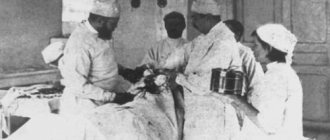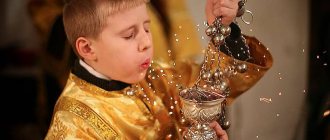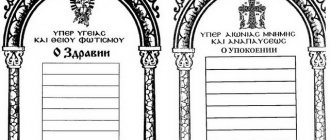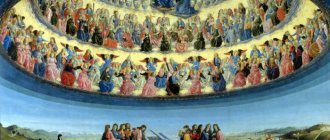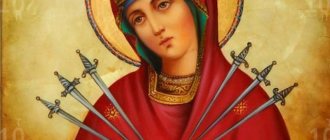Venerable Theodore the Studite, abbot
Born in 758 in Constantinople and received a broad and varied education. Having deeply studied the Holy Scriptures, Saint Theodore successfully resisted the iconoclast heretics in disputes about the Orthodox faith. Having accepted monasticism, he labored in the monastery of Sakudion (not far from Mount Olympus in Bithynia), established by his uncle Plato, where he later became abbot, setting a high example of virtue with his life. In 796, for zeal for the preservation of church rules and denunciation of the lawlessness of Emperor Constantine VI Porphyrogenitus, after severe torture, he was exiled to prison in the city of Thessaloniki.
During the reign of Empress Irina, the monk was returned from exile and was given control of the desolate Studii monastery. Soon up to a thousand monks gathered in the monastery. To manage the monastery, the Monk Theodore drew up a cenobitic charter of monastic life, which received the name Studite, and the blessed abbot - the name Studite (about 1065, this charter was adopted by the Monk Theodosius in the Pechersk Monastery and from here spread throughout all Russian monasteries). The saint also wrote many helpful books, words of praise for the Lord's and Mother of God's feasts, many canons and three songs.
Under the emperors Nikephoros I (802–811) and Leo the Armenian (813–820), St. Theodore suffered a lot for the veneration of icons and was imprisoned first in Illyria, in the fortress of Metope, and then in Anatolia, in Bonita. After the death of Leo the Armenian, the Monk Theodore, released from captivity, settled in the city of Chersonese (Bithynia).
Despite his serious illness, he celebrated the Divine Liturgy daily and taught the brethren. Here he died peacefully in 826. At the same hour, the blessed death of the saint of God was revealed by the Lord to St. Hilarion of Dalmatia (June 6/19). He saw how the heavenly light shone, angelic singing and a voice was heard: “This is the soul of the Monk Theodore, who even suffered to the point of bleeding for the holy icons, goes to the Lord.”
In 845 the relics of St. Theodore were transferred to the Studite monastery. His brother, the Monk Joseph, Bishop of Thessalonica, also suffered from the iconoclasts and died in 830 in the Studite monastery, where his relics rest.
The Monk Theodore performed many miracles both during his life and after his death. Those who called on his name were saved from fires, from attacks by wild animals, and received healing of ailments.
See also: “The Life of Our Venerable Father Theodore the Studite” as presented by St. Demetrius of Rostov.
Canon to the Holy Venerable Theodore the Studite
Song a҃.
Irmos:
The chariot-drivers of the Pharaohs invaded, which sometimes created the Myseya rod, which struck and divided the sea, and also he saved the pedestrian, singing the song of God.
with bright sparkles of light, the all-luminous pillar, in other words, was, a pipeline, a god, to the earth The promises of the god are very scrupulous, mysteriously indescribable, theodore.
With all-joyful, unflagging mantras towards the future and the outcome, before the end, the death of life-giving life, life, and life The life of an ageless person today is worthy, even more so for the future.
Having conquered the passions of the game, and our aspirations, youthful, blessed, everything has been reproached, we have shown more, You should honor this image in the first place, bgoprїѧ́tne, and in the holy imagination.
With purified thought, with all our souls, with the inspired writings, as we see, we have collected a wealth of virtues, and pious dogmas, we see Become rich, and live in luminosity, in all respects, etc.
Bgorodichen:
The words of the incarnate gave birth to the same, and the first bodiless, the blessed one in the world who lived the natural, all-immaculate btsⷣthe two. Therefore, we respect everything, according to our representatives.
Song of the city.
Irmos:
Confirm at the beginning of the world, and the earth on the waters, on the stones, the temple, your commandments are firmly established: ꙗ҆ There is no light, more than you, who is more person-loving.
Let us live with all, blessedly, with all our hearts, we endure all the illnesses we endure, we endure our cruelty, and we conclude in prison, ꙗ҆́кѡ ѻ҆́́́бшнск стⷭ҇тей и҆ црⷭ҇твїѧ was є҆sѝ.
We are protected by God, and at the same time we kindle with jealousy, the foulness of the lawless destroyers of yours, everyone My dear, thanks be to God, and therefore, we are rich and worthy.
In the vision of deeds, in the deeds of theology, he was one of us, a god of words, a fastnik, a teacher, a holy martyr, a glorious saint, an Orthodox table n, tsr҃kve ᲂу҆vergїne.
Bgorodichen:
Compassionate and meaningful word, to renew the desires of the ancestor, according to the posture of that and from you, chⷭ҇taѧ, prїѧ́t, st҃ That's it.
Sedalen, voice g.
Bzhⷭ҇tvennyh dogmas are rich in everything, he complied with all Orthodoxy, advocating for the Nude, the Fatherland, in captivity, the victims and the benign Well, in the dungeons I suffered great misfortunes, moreover, the Lord, God pray, grant us great mercy.
Bgorodichen:
The Bzhⷭ҇tvenna tabernacle was the same words, the most precious two, surpassed in purity aggly, more than all of me the former finger, the square not carnal sins, but the purity of your prayers with divine waters, which supply, so to speak, great mercy.
Krⷭ҇tobgorodichen:
An unfiltered word, an imperishable word, on the edge of the sight is hung and a painless cry has passed through, and I cry cabbage soup, crying: You are with me, my child, as you suffer by will, wanting to relieve the passions of dishonorable people;
Song of the day.
Irmos:
You are my fortress, where you are, you are my strength, you are my god, you are my joy, you do not destroy the depths of my soul, and our poverty is visited ́въ. In the meantime, with a great cry, a call to you: glory to your strength, love of men.
This is the name given to the gift of this world, the rich gift of this world, which is the source of the world and the true origin of the world. Blessed are you, blessed Theodore. Thus, the teachers, fasters and witnesses brought joy to many people.
I am firm and strong against your laziness! And for the sake of the monks, the savagery was trampled by him, and for the sake of your righteousness, especially for the good government, the final bliss befell him, bggom Dear friend, with the disembodied ones: glory is in your strength, love-loving one.
The verb "bzhүїy" in you is ꙗ҆́вѣвѣвѣвівьї, dogmѡѡv, יסיבבבבבבבקיבה ׳יסייבקיים בייסק Your disciples, divinely inspired, grateful, scream with incessant voices: glory to your strength, man-loving.
Bgorodichen:
In total, there is a person in you, all of everything, everything, everything, we unite, and even all of them do not eat, and in your womb everything If you please, we will enrich the world with your wealth.
Song є҃.
Irmos:
All day long, your face, the indispensable light, and covered your face. but take me, and direct me to the light of your commandments, I pray.
In other words, the temple is omniscient and omnipresent, alive and well, fragrant He brought sacrifices to himself, that is, the priest and the sacrifice were.
We are blessed, blissful, the dawn of dhha, everyone has shone with the divine language of the most holy one, embodied, and What are the words, the ineffable, that is, the sacrament.
Let us remember from now on that we pray for the passions and will deliver the blessed and the holy and honest I am in memory of your sufferings, God of God.
Bgorodichen:
Unspeakably, two times, the dream of life has infused everything into it, a person happens, first of all, a person is born It saves, and it builds to life and imperishability, and it brings good things to life.
Song of ѕ҃.
Irmos:
Cleanse the world, thank you, I have raised my sins, and from the depths I have raised, I pray: I have cried out to you, and hear me Please save my life.
In general, your whole life, the Holy Verb, has accomplished everything, but with truth it is beautiful, with greatness and strength, with the red chariot of goodness He combined the people with himself, most blessed saint.
The blessings of the blessed dogma of your words, and from the depths of the world, will rise to all, to all, Orthodoxy to the extreme.
Everything will be bright for you, and this time, moreover, with the joy of today's light: the world will prosper Yes, all-blessed Feodder, and the cedar has multiplied, venerable one.
Bgorodichen:
Yes, and let us rid you of all your sins with your prayers, Mother of God, and let us forgive you, prestga, bzhⷭ҇tvennagѡ ѡ҆sїѧ́nїѧ , and from you the indescribable embodied dream.
Kontakion, voice v҃.
Your fasting and equal life is filled with suffering, and your fellow celebrant, blessedly, has lived, Feodѡre: bg҃ꙋ do not stop praying for all of us.
Ikos:
Fasting with holy kindness, the Church of Christ is confirmed, now we praise Theodore: a new pillar of fire ѧ, the heads of the religious, enlightening people to the faith of justice, to the divine city of the highest world, came same as others, enter. To him we also agree with the cry: O omnipotent one, do not forget, keep the constant prayers of all of us.
Song z҃.
Irmos:
Bzhґїѧ condescension ѻ҆́гн ᲂу҆́́сѧ in Vavѷlѡѡnѣ sometimes, now for the sake of ѻ҆́́gni in the cave with a happy foot, ꙗ҆́кѡ in ts The vegetative face is cheerful, singing: blessed be the blessing of ours.
Having seen the seer of your vision of purity, the verbal ones of the eternal shepherd, therefore, he offers, even now, to the all-blessed one, call, eodѡre, merry: blessed be the god of ours.
You remain in the likeness of this image, blessed, human beings, and you remain a fighter against them even to the point of blood, and even to the point of blood , Feodѡre: Blessed be the God of ours.
Your word is salty, you are all-rich, and your life, moreover, is enlightened by the dawn of the spirit, and now it shines, howling we are glad: blessed be ours.
Bgorodichen:
Nowadays, I have fulfilled two blessings of the blessed one: prayers to your true person, to the Mother of God, and to the Mother of God the wealth of grace is now, blessed be our God.
Song and.
Irmos:
By the sevenfold furnace of the Chaldean scourge, the godly fury kindled, and by the power of the best they were saved by this species, the creator and the savior who cried out. Above: Fathers, bless, priests, sing praises, people, exalt to all ages.
They drove away showed, bggonose ѳеоdѡre, ѡ҆рѣтсвсв ѕлічо́йх є҆ресиѝ, ᲂу҆ча́ honor the ѻ҆́́zаr хрⷭ҇tóвъ, worship Let us honor God and sing: priests, bless, people, exalt him forever.
In all your life, the God of God, the Orthodox God, was the leader, the most luminous lamp, the most divine teacher, The image of the monks, and the well-known law-writer, begin to chant: priests, bless the Lord’s temple, and exalt him forever.
On earth he labored, a pious defender, and an undeceitful accuser of untruths, the all-blessed, former, the gift of God, and on earth his right. He has crowned all the crowns, now he has accomplished it all, and the faith has kept it, exalting the temple forever.
With the meaning of the meaning, we have decorated everything, in general, with all our desires, and with great greatness, we have honored you with all our hearts, Having truly corrected your holy powers, I agree with the chants: children, bless, priests, sing praises, people, extol him in eyelids.
Bgorodichen:
Blessed is the most blessed, dear one of my pages and sins of purity: God is born, blessed above all, the Holy Mother of God ѧ, and from virginal inconsistencies. He will bless all creation and exalt it to all ages.
Song ѳ҃.
Irmos:
Oh, the horrors of our family, and the earth's ends, our lives are carnal, and your womb is space-free. the greatest heaven. That's why they call bureaucrats.
Through the flow of your tears, O faster, and the originators of blood, O witness of the Christians, enlightening all, sїѧ́eshi ѻ҆boyfriend sv This is true, holy, holy, sacred priest, in the life of the people, now we are enlightening in the unoccupied, treble to my wife.
Your pure life has passed, in the midst of the villages you now live, the crown of good fortune before, and the kingdom of this day, great The other and the sacred: in the present day we stand before the bridegroom, enjoying the divine.
Seeing the good source, God's God, who has passed through life has been blessed with the greatest truth, the world's truth Living a pure life of freedom, a witness and a passion-bearer was more sacred.
The words of your gifted gifts to us all are heard: speed, all-validation, thunder, universes at the end, and the skin of rivers flows Yours is written off. Thus, this word and word are worthy of the name.
Bgorodichen:
Let us say that it is better to give birth to a good word in the body, which is better for your heart. ꙋ, before all ages, we are blessed, and now the body has exceeded its size, and also the body has become lighter.
Luminous.
Ꙗ҆́кѡ pillar ѡ҆дꙋmoved ꙗ҆вслѧ є҆сѝ dogmas of Orthodoxy piety, ѡ҆chіchiv і҆кіного́рцѡв the charm: tѣm and By suffering and having made a confession, Father, he became glorified.
Bgorodichen:
All the faithful petitions are being offered to those who were born and are now being offered to you, all the same, we are multiplying and even more so. Therefore, do not stop praying for us.
Prayers for stomach diseases, hernia and other abdominal diseases
Font
Prayer book / Prayers for every need
Great Martyr Artemy
(Artemy was crushed by his tormentors with a huge stone, because of which his insides were forced out. Most of his miraculous healings were healing those suffering from stomach pain.)
Troparion
Be strengthened by the true faith of Christ, O passion-bearer, you have defeated the tormentor of the wicked king with that idol’s exaltation. That from the Great King, who reigns forever, was bestowed with a bright crown of victory, healing all the sick and calling on you, Artemy the Great, pray to Christ God to save our souls.
Kontakion, tone 2
The pious and crowned martyr, who overcame the enemies of victory, having come together, we worthily praise Artemy with songs, the great martyr, the great giver of miracles, praying to the Lord for all of us.
Venerable Theodore the Studite
(St. Fedor suffered from stomach pain during his lifetime, and after his death they received healing from stomach pain from his icon.)
Prayer
O sacred head, reverend father, blessed Abbot Theodora, do not forget your poor to the end, but remember us always in holy and auspicious prayers to God: remember your flock, which you yourself shepherded, and do not forget to visit your children, pray for us, father sacred, for your spiritual children, as you have boldness towards the Heavenly King: do not keep silent to the Lord for us, and do not despise us, who honor you with faith and love: remember us unworthy at the Throne of the Almighty, and do not stop praying for us to Christ God, for You have been given the grace to pray for us. We do not imagine that you are dead: even though you have passed away from us in body, but remain alive even after death, do not depart from us in spirit, keeping us from the arrows of the enemy and all the charms of the demonic and the machinations of the devil, to our good shepherd even more than the relics your cancer is always visible before our eyes, but your holy soul with the angelic hosts, with the disembodied faces, with the heavenly powers, standing at the Throne of the Almighty, worthily rejoices, knowing that you are truly alive after death, we fall down to you and we pray to you: pray about us to the Almighty God, about the benefit of our souls, and ask us time for repentance, so that we may pass from earth to heaven without restraint, and from bitter ordeals, demons of air princes and from eternal torment, may we be delivered from eternal torment, and may we be heirs of the Heavenly Kingdom with all the righteous, from all eternity have pleased our Lord Jesus Christ: to Him belongs all glory, honor and worship, with His Father without beginning, and with His Most Holy and Good and Life-giving Spirit, now and ever, and unto ages of ages. Amen.
Troparion to the Saint, tone 8
In you, father, it is known that you were saved in the image of the cross, for you followed Christ, and you taught in action to despise the flesh, for it comes: be diligent about the souls, things that are immortal: in the same way, Reverend Theodora, your spirit rejoices with the Angels.
Kontakion to the Saint, tone 2
Having divinely armed yourself with spiritual purity, and having firmly handed over unceasing prayers like a copy, you prosecuted the demonic militia of Theodora, pray unceasingly for all of us.
Greatness to the Reverend
We bless you, Reverend Father Theodore, and honor your holy memory, teacher of monks and interlocutor of Angels.
Unmercenary martyrs Cyrus and John
Troparion 1, tone 5
The Trinity grace has entered into your honest hearts, blessed Cyrus and John, and has appeared against the terrible spirits of unclean spirits. And not just a revealed, but a secret illness, the doctor quickly, with the same boldness towards God, the Lover of Mankind, heal our spiritual passions with unceasing prayer.
Troparion 2, tone 5
Glorious saints Cyrus and John, unmercenaries, martyrs and miracle workers, with your mercy, like an insurmountable wall, protect us from all troubles and preserve us from enemies visible and invisible through your unceasing prayer to the Lord.
Kontakion for the Unmercenary, Tone 2
When you receive grace for healing, you extend health to those in need, physicians, wonderworkers of glory; but by your visit to the warriors, you overthrow insolence, healing the world with miracles.
List of prayers
Experience in the treatment of gastroesophageal reflux disease
Ensuring effective control of gastric secretion is one of the main conditions for successful treatment of so-called “acid-dependent” diseases of the upper gastrointestinal tract. In clinical and outpatient practice, currently, second-generation (ranitidine) and third-generation (famotidine) H2-receptor blockers of histamine are most often used to inhibit hydrochloric acid by parietal cells of the gastric mucosa, somewhat less frequently - proton pump inhibitors (omeprazole, rabeprazole), and for neutralization of hydrochloric acid already released into the stomach cavity - antacid drugs. Antacids are sometimes used in the treatment of patients suffering from so-called “acid-dependent” diseases, in combination with H2-blockers of histamine receptors; sometimes as on-demand therapy in combination with proton pump inhibitors. One or two chewed antacid tablets do not have a significant effect [10] on the pharmacokinetics and pharmacodynamics of famotidine used at a dose of 20 mg.
There are certain differences between these medications; we list the main ones: different mechanisms of action; speed of onset of therapeutic effect; duration of action; varying degrees of effectiveness of their therapeutic action depending on the time of taking the drug and eating; cost of medications [1]. The above factors are not always taken into account by doctors when treating patients.
In recent years, the literature has increasingly discussed the issues of pharmacoeconomic effectiveness of the use of various medications used according to one or another regimen in the treatment of “acid-dependent” diseases [2, 7]. The cost of examination and treatment of patients is especially important to consider in cases where patients, due to the characteristics of the disease, require long-term treatment [4, 6], for example, with gastroesophageal reflux disease (GERD). This is a very common disease, and the examination and treatment of such patients requires significant costs.
As is known, most patients with GERD do not have endoscopic signs of reflux esophagitis. However, as GERD progresses, pathological changes in the esophageal mucosa appear. The symptoms of this disease have the same impact on quality of life as the symptoms of other diseases, including coronary heart disease [5]. It has been observed [8] that GERD has a negative impact on quality of life, especially on pain scores, mental health and social function. Patients suffering from GERD are at high risk of developing Barrett's esophagus, and then adenocarcinoma of the esophagus. Therefore, at the very first clinical symptoms of GERD, especially when endoscopic signs of esophagitis occur, it is necessary to pay sufficient attention to timely examination and treatment of such patients.
Currently, patients with GERD are treated, in particular, with the drug famotidine (gastrosidine) in usual therapeutic dosages (20 mg or 40 mg per day). This drug has a number of advantages: ease of use (1-2 times a day), high efficiency in the treatment of “acid-dependent” diseases, including compared to antacid drugs [9], as well as greater safety compared to cimetidine. However, observations have shown [1] that in some cases, to increase the effectiveness of therapy, it is advisable to increase the daily dose of gastrosidine, which, according to some observations [1], reduces the likelihood of side effects compared to the use of histamine first H2 receptor blockers (cimetidine) in higher doses ) and second (ranitidine) generations. The advantage of famotidine [11] over cimetidine and ranitidine is its longer inhibitory effect on the secretion of hydrochloric acid by parietal cells of the gastric mucosa.
There are other advantages of histamine H2 receptor blockers (ranitidine or famotidine) over proton pump inhibitors; in particular, prescribing these drugs at night allows them to be used effectively in the treatment of patients due to the absence of the need to observe a certain “temporary” connection between the intake of these drugs and food. Prescribing some proton pump inhibitors at night does not allow them to be used to their full potential: the effectiveness of proton pump inhibitors is reduced, even if these drugs are taken by patients in the evening and an hour before meals. However, 24-hour pH monitoring carried out in patients treated with omez (20 mg) or famotidine (40 mg) indicates [3] that the duration of action of these drugs (10.5 hours and 9.4 hours, respectively) does not overlap the period of night secretion, and in the morning, a significant proportion of patients again experience “acidification” of the stomach. In this regard, it is necessary to take these drugs in the morning.
Of particular scientific and practical interest is the study of the effectiveness and safety of the use of famotidine and omeza (omeprazole) in higher dosages in the treatment of patients suffering from “acid-dependent” diseases of the upper gastrointestinal tract.
We studied the results of clinical, laboratory and endoscopic examination and treatment of 30 patients (10 men and 20 women) suffering from GERD in the stage of reflux esophagitis. The age of patients is from 18 to 65 years. Upon admission to the TsNIIG, 30 patients showed the main clinical symptoms of GERD (heartburn, chest pain and/or epigastric pain, belching), 25 patients had clinical symptoms mainly associated with impaired motility of the upper gastrointestinal tract (feeling of rapid saturation, fullness and distension of the stomach, heaviness in the epigastric region), usually occurring during or after meals. The combination of certain clinical symptoms, the frequency and time of their occurrence, as well as the intensity and duration of different patients were different. No significant deviations in blood parameters (general and biochemical tests), urine and feces tests were noted before the start of therapy.
During esophagogastroduodenoscopy (EGDS), 21 patients were diagnosed with reflux esophagitis (in the absence of erosions), including 4 patients with cicatricial ulcerative deformation of the duodenal bulb and one patient with a slit-like ulcer of the duodenal bulb (5 patients suffered from duodenal ulcer intestines, combined with reflux esophagitis). In addition, one patient had a peptic ulcer of the esophagus against the background of reflux esophagitis, and 8 patients had erosive reflux esophagitis. In all patients, according to endoscopy, cardiac insufficiency was detected (in combination with or without axial hiatal hernia).
In the treatment of such patients, gastrosidine (famotidine) was used at a dosage of 40-80 mg per day for 4 weeks (the first 2-2.5 weeks of treatment were carried out in the TsNIIG hospital, in the next 2 weeks patients took gastrosidine in an outpatient setting). Gastrosidin therapy was always started and continued in the absence of significant side effects; patients were prescribed 40 mg 2 times a day for 4 weeks; only when diarrhea and urticaria appeared, the dosage of gastrosidine was reduced to 40 mg per day.
The study was carried out taking into account the criteria for inclusion and exclusion of patients from the study according to the rules of clinical practice.
During endoscopy, NR was determined using a rapid urease test (one fragment of the antrum of the stomach within 2-3 cm proximal to the pylorus) and histological examination of biopsy material (two fragments of the antrum within 2-3 cm proximal to the pylorus and one fragment of the body of the stomach within 4-5 cm proximal to the angle of the stomach). When examining patients, if necessary, ultrasound of the abdominal organs and X-ray examination of the gastrointestinal tract were performed. The data obtained, including identified side effects, were recorded in the medical history.
During the study period, patients did not additionally take proton pump inhibitors, histamine H2 receptor blockers, or other so-called “anti-ulcerogenic” drugs, including antacids and agents containing bismuth. 25 out of 30 patients (84%) due to the presence of clinical symptoms, most often associated with impaired motility of the upper digestive tract, additionally received prokinetics: domperidone (Motilium) for 4 weeks or metoclopramide (Cerucal) for 3-4 weeks.
Treatment of patients with GERD in the stage of reflux esophagitis always began with the administration of gastrosidin 40 mg 2 times a day (it was assumed that in the event of significant side effects, the dose of gastrosidin would be reduced to 40 mg per day). After 4 weeks from the start of treatment (taking into account the condition of the patients), in the presence of clinical signs of GERD and (or) endoscopic signs of esophagitis, therapy was continued for another 4 weeks. After 4-8 weeks, based on the results of clinical, laboratory and endoscopic examination, it was planned to summarize the results of treatment of patients with GERD.
When treating patients with gastrosidine (famotidine), the following factors were taken into account: the effectiveness of gastrosidin in suppressing both basal and nocturnal and food- and pentagastrin-stimulated hydrochloric acid secretion, no changes in the concentration of prolactin in the blood serum and antiandrogenic effects, no effect of the drug on the metabolism of other drugs in the liver funds.
Based on the results of an analysis of the examination and treatment of patients with GERD in the stage of reflux esophagitis, in most cases the therapy was found to be effective. During treatment in patients with GERD with reflux esophagitis (in the absence of erosions and peptic ulcers of the esophagus), the main clinical symptoms disappeared within 4-12 days; in patients with erosive reflux esophagitis, chest pain gradually decreased and disappeared on the 4-5th day from the start of taking gastrosidin; in a patient with a peptic ulcer of the esophagus against the background of reflux esophagitis - on the 8th day.
Two out of 30 patients (6.6%) refused to take gastrosidin 2-3 days after the start of treatment, in their words, due to increased pain in the epigastric region and the appearance of dull pain in the left hypochondrium, although objectively their condition was quite satisfactory . These patients were excluded from the study.
According to endoscopy, after 4 weeks of treatment, endoscopic signs of reflux esophagitis disappeared in 17 out of 28 patients (60.7%), and positive dynamics were noted in 11 patients - a decrease in the severity of esophagitis. Therefore, these patients were subsequently treated with gastrosidin in an outpatient setting for another 4 weeks, 40 mg 2 times a day (7 patients) and 40 mg 1 time a day (4 patients in whom the dosage of gastrosidin had previously been reduced).
The question remains very controversial: should we consider reflux esophagitis, often observed with peptic ulcer disease (most often with duodenal ulcer disease), as a complication of this disease, or should we consider it an independent disease concomitant with peptic ulcer disease? Our long-term observational experience shows that, despite some connection between GERD and peptic ulcer (their relatively frequent combination and even the appearance or exacerbation of reflux esophagitis as a result of anti-Helicobacter therapy), still peptic ulcer and GERD (including in the reflux stage -esophagitis) should be considered independent diseases. We have repeatedly observed patients with frequent exacerbations of GERD in the stage of reflux esophagitis (if they had cicatricial and ulcerative deformation of the duodenal bulb). The last exacerbation of peptic ulcer (with the formation of an ulcer in the duodenal bulb) in these patients was observed 6-7 or more years ago (much less often than relapses of GERD in the stage of reflux esophagitis), however, with the next exacerbation of peptic ulcer with the formation of an ulcer in the duodenal bulb Reflux esophagitis was always detected during endoscopic examination of the intestines. We are confident that with the availability of modern medications, it is much easier to treat uncomplicated peptic ulcer disease than GERD: the period of therapy for exacerbation of duodenal ulcer disease takes significantly less time compared to therapy for GERD; and during the period of remission of these diseases, patients with duodenal ulcer feel more comfortable, while patients with GERD are forced to refuse to take significantly more foods and drinks to improve their quality of life.
Upon examination (after 8 weeks of treatment), three of 11 patients still had complaints associated with impaired motility of the upper gastrointestinal tract. Three patients, although feeling well, refused to undergo a control endoscopy after 8 weeks. According to endoscopy, in 7 out of 8 patients there was a disappearance of endoscopic signs of esophagitis (including healing of a peptic ulcer of the esophagus in one patient).
Determination of NR was carried out in all 30 patients: in 11 cases, NR contamination of the gastric mucosa was revealed (according to the rapid urease test and histological examination of targeted gastrobiopsy materials). Anti-Helicobacter therapy was not administered to patients with GERD in the stage of reflux esophagitis during treatment.
When assessing the safety of the treatment, no significant deviations in laboratory parameters of blood, urine and feces were noted. In 4 patients (13.3%), who previously had “normal” (regular) stools, on the 3rd day of treatment with gastrosidin (at a dose of 40 mg 2 times a day), in their words, “loose” stools were noted (mushy, without pathological impurities), and therefore the dose of gastrosidin was reduced to 40 mg per day. 10-12 days after reducing the dose, the stool returned to normal without any additional therapy. It is interesting to note that in another 4 patients who previously suffered from constipation, during treatment, stool returned to normal on the 7th day. In 3 out of 30 patients (10%), on the 3-4th day of taking gastrosidin, rashes appeared on the skin of the torso and limbs (urticaria). After reducing the dosage of gastrosidin to 40 mg per day and additional treatment with diazolin (0.1 g 3 times a day), the skin rashes disappeared.
Studies have shown the feasibility and effectiveness of therapy for GERD in the stage of reflux esophagitis with gastrosidine 40 mg 2 times a day, especially in the treatment of patients with severe pain and heartburn. Such treatment can be successfully carried out in inpatient and outpatient settings. Studying the long-term results of the treatment will make it possible to determine the duration of the period of remission of this disease and the advisability of treatment with gastrosidin as “maintenance” therapy or “on-demand” therapy.
For questions about literature, please contact the editor
Prayer to all saints and ethereal heavenly powers
Holy God and rest in the saints, glorified by the thrice-holy voice in heaven from Angels, praised on earth by man in His saints: having given grace to each by Thy Holy Spirit according to the bestowal of Christ, and by that ordaining Thy holy Church to be Apostles, prophets, and evangelists , you are shepherds and teachers, preaching in their own words. You yourself, who act all in all, have accomplished many holiness in every generation and generation, having pleased you with various virtues, and leaving us with an image of your good deeds, in the joy that has passed, prepare, in it the temptations themselves were, and help us who are attacked. Remembering all these saints and praising their godly lives, I praise You Himself, who acted in them, and believing in Your goodness, the gift of being, I diligently pray to You, Holy of Holies, grant to me a sinner to follow their teaching, moreover, by Your all-effective grace, heavenly ones with them be worthy of glory, praising Your most holy name, the Father and the Son and the Holy Spirit forever. Amen.
Great Martyr and Healer Panteleimon
First prayer
O great servant of Christ and glorious healer, Great Martyr Panteleimon! With your soul in Heaven stand before the Throne of God and enjoy His Trinitarian glory, the body and face of the saint rested on earth in the Divine temples and various miracles were exuded by the grace given to you from above, look with your merciful eye on the people ahead, more honorable than your icon, tenderly praying and asking for healing from you help and intercession: extend your warm prayers to the Lord our God and ask our souls for forgiveness of sins. Behold, we, for our iniquity, do not dare to raise our hair to the heights of heaven, lower to raise the voice of prayer to His unapproachable glory in the Divine, with a contrite heart and a humble spirit for you, a merciful intercessor to the Lady and a prayer book for us sinners, we call upon you, as you have received Thou art the grace from Him to drive away illnesses and heal passions. We therefore ask you: do not despise us, unworthy, who pray to you and demand your help. Be a comforter to us in our sorrows, a physician to those who suffer in the worst of times, a quick protector to those who are suffering, a giver of insight to those who are ill, a ready intercessor and healer for those who are sick and infants in sorrows: intercede for everyone everything that is useful for salvation, as through your prayers to the Lord God you have received grace and mercy, let us glorify all the good Source and Giver of God, the One in the Trinity of Holy Ones, the glorified Father and the Son and the Holy Spirit, now and ever and unto the ages of ages. Amen.
Second prayer
O glorious martyr and good warrior of the Heavenly King, the all-blessed Panteleimon, the most eminent imitator of the merciful God, having boldly confessed Christ on earth, and having endured manifold torments for Him, you have, unfadingly, received a crown in Heaven, where you enjoy eternal bliss, and with boldness before the Throne of the Trisolar Divinity stoishi ! All of us sinners resort to your Christ-like compassion for God, and we all diligently pray to you, our warm intercessor and representative: do not cease to look upon us who are in need and sorrowful circumstances, and with your prayerful help and healing power, always deliver us from cruel evils and all-destructiveness and all sorts of other troubles and illnesses. For you, holy one, have received the boundless grace of healing from our Savior Jesus Christ for your firm faith in Him, with a pure and immaculate life, sealed by martyrdom and your many-victorious death, in which, by the grace given by you, you were named by Christ Panteleimon, the same-named of mercy, having mercy on all those who come to you in sorrow and illness. For this reason, since you are a merciful helper and healer in everything, we call on you with faith: hear us and through your God-pleasing intercession give us everything useful in this life and necessary for eternal salvation. With your martyrdom, beg the merciful God to have mercy on us, sinners and unworthy, according to His great mercy, and deliver us from cowardice, flood, fire, sword and all righteous anger and reproach, prompting us in good time to cleansing and propitiatory repentance for our sins, for the sake of the multitude of His bounty, may He give us all a comfortable, quiet and God-pleasing life, and may His Angel protect us all from all enemies, visible and invisible, with His grace and invincible militia, in whose image we are protected and instructed, may we live in this world in repentance, purity and in doing godly deeds; May we be worthy, through your warm intercession, to achieve a Christian death that is painless, peaceful, and shameless, to get rid of the machinations of the airy princes of darkness and from eternal torment, and to be heirs of the endless, all-blessed Kingdom. Hey, servant of God! Do not cease to pray for us sinners, and through your intercession of temporary and eternal troubles, deliverance, we magnify you, our intercessor and prayer book, and we eternally glorify our common Master and Lord Jesus Christ, to Him belongs all glory, honor and worship with His Beginning Father and the Most Holy Spirit, now and ever and unto ages of ages. Amen.
Prayer three
Holy Great Martyr and Healer Panteleimon! Pray to God for us and do not allow those illnesses that hurt us in soul and body to remain in us any longer! Heal those ulcers and scabs that have been caused to us by our passions. We suffer from laziness and relaxation - we are healed. We suffer from attraction and addiction to earthly objects - we are healed. We are sick, O Saint Panteleimon! We suffer from forgetfulness: about the matter of salvation, about our sins and weaknesses, about our responsibilities - heal us. We are sick with resentment, anger, hatred - heal, O healer of St. Athos and the world. We are sick with envy, pride, arrogance, exaltation, despite all the poverty and lewdness - we are healed. We suffer from many different attacks of carnality: gluttony, intemperance, gluttony, lust - we are healed. We are sick with drowsiness, verbosity, idle talk, judgmentalism - heal us, O Saint Panteleimon! Our eyes hurt from sinful views, our ears hurt from listening to idle talk, slander, slander - heal us. Our hands hurt because we are disinclined to pray and give alms - heal us. Our legs hurt from the reluctance to hastily go to the temple of the Lord and the desire to walk through the haystacks and visit the houses of the world - we are healed. Our tongue hurts, our lips hurt greatly: through idle talk, idle talk, slander, turning away from prayers and praises, or pronouncing them carelessly, absent-mindedly, without attention, without understanding - heal us, oh mercy! We hurt from head to toe: our minds hurt with lack of understanding, unreasonableness and madness; Our will hurts, turning away from holy pursuits and striving for deeds that are harmful and ungodly; Our memory hurts, forgetting our sins and never losing sight of the sins and insults of our neighbors; Our imagination hurts, unable and unwilling to vividly imagine to us our death, the eternal torment of sinners, the blessings of the Kingdom of Heaven, God's wrath, Christ's suffering on the cross, His crucifixion - heal us, O Saint Panteleimon! Everything in us hurts. Our entire soul, with all its strengths and abilities, is also weak. Our whole body with all its members is also weak. Heal us, O Saint Panteleimon, merciless and loving Healer, servant of the Most Holy Theotokos, and do not leave our damnation in the great ailments and in the great infirmities: may you be healed by your grace, I will glorify the Most Holy Trinity, the Father and the Son and the Holy Spirit and the Most Holy Theotokos, to you sending to serve the sick, and I will thank you, O Saint Panteleimon, the whole-bearing shrine forever. Amen.
Prayer four
O great saint of Christ, passion-bearer and merciful physician, Panteleimon! Have mercy on me, a sinful slave, hear my groaning and cry, propitiate the heavenly, supreme Physician of our souls and bodies, Christ our God, may He grant me healing from the illness that oppresses me. Accept the unworthy prayer of the most sinful man above all. Visit me with a gracious visit. Do not disdain my sinful sores, anoint me with the oil of your mercy and heal me: yes, healthy in soul and body, I can spend the rest of my days, by the grace of God, in repentance and pleasing God and will be worthy to receive the good end of my life. Hey, servant of God! Pray to Christ God, that through your intercession he may grant me health to my body and salvation to my soul. Amen.
Fifth prayer
(thanksgiving, after healing from illness)
Holy Great Martyr, Healer and Wonderworker Panteleimon, all-round servant of God and constant prayer book of Orthodox Christians! You are worthily named Panteleimon, the all-merciful hedgehog, for having received from God the grace to pray for us and to heal illnesses, you richly give to everyone who comes to you, various healings and everything needed for temporary life and salvation: for this reason we are not worthy, having been granted Your mercy, again, before your holy icon, we resort to you, and glorifying you, as a sincere saint of God, our faithful prayer book and healer, we fervently thank you and the giver of all the good things of the Lord our God for the great blessings that you have given us from Him. Therefore, mercifully accept this small prayerful thanksgiving of ours, before imams give you anything other than what is due to you, and for the rest of our lives do not deprive us, weak and sinners, of your help and prayerful intercession with the Lord our God, to Him belongs all glory, thanksgiving and worship. , Father and Son and Holy Spirit, now and ever and unto ages of ages. Amen.
Prayer six
Holy great martyr and healer Panteleimon, merciful imitator of God! Look with mercy and hear us, sinners, praying earnestly before your holy icon. Ask us from the Lord God, who stands before Him with the Angels in heaven, for the forgiveness of our sins and transgressions. Heal the mental and physical illnesses of the servants of God, now remembered, those present here, and all Orthodox Christians who flow to your intercession. Behold, because of our fierce sin, we are possessed by many ailments and are not imams of help and consolation, but we resort to you, as you have given the grace to pray for us and heal every ailment and every disease. Grant therefore to all of us through your holy prayers health and well-being of souls and bodies, advancement of faith and piety and everything necessary for temporary life and salvation. For, having been granted great and rich mercies by you, let us glorify you and the giver of all blessings, marvelous among the saints, our God, the Father, and the Son, and the Holy Spirit. Amen.
